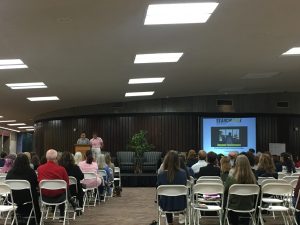By Joe Rull / NM News Port
Local law professionals are teaming up with reporters to try and open the discussion about the way the public education system handles behaviorally challenged students.
The University of New Mexico School of Law hosted a public forum Monday night discussing the major issues in the public education system’s handling of behaviorally challenged students.
Presented by investigative reporting organization Searchlight New Mexico, the forum explored the troubling usage of restraint and seclusion tactics to punish children with behavioral and developmental difficulties — something the publication reported on earlier this month.
Within the Albuquerque Public School system, restraint is commonly referred to as “therapeutic holding” or “physical management” and involves physically restraining a child as a means of behavior management. Searchlight found that this practice often leads to incidents of injury and trauma to both students and staff. Often, children displaying behavioral issues are forced into seclusion rooms, which themselves can be unsafe for children, as some of these spaces are unventilated and “so small as to violate state safety standards,”New Mexico Searchlight reports.
For 10-year-old Montezuma Elementary student Urijah Salazar, the effects of these controversial practices are all too real. Searchlight’s analysis of Salazar’s education records show that his experience with various diagnoses — oppositional defiant disorder, sensory processing disorder, expressive and receptive language disorder — have led to more than 150 cases of physical restraint over the past four years.
“My son has been subjected to traumatizing mental, emotional, and physical scarring and anguish,” Urijah’s mother Nadia McGilbert said at Monday’s forum. “One day, my son will enter into society as a young adult… and when he reflects back on his memories of elementary school, he will remember being restrained, staying in seclusion like a psychiatric patient because of his disability,” she said while holding back tears.

Searchlight reports that APS refused to release its in-depth records of restraint and seclusion practices to the public, as these incidents often occur without adequate legal documentation.
“There is no accountability, there is no reporting,” civil rights and disability attorney Gail Stewart said. “As a lawyer, I’m disappointed to tell you that the law has been so unsuccessful at addressing this problem and children continue to be hurt.”
New Mexico is just eight years removed from banning corporal punishment in public schools, and issues resulting from restraint and seclusion incidents are still at the forefront of many parents’ minds.
“At this time in New Mexico, we have parents who are forced to homeschool,”Stewart said. “We have parents who are keeping kids home in order to assure that they will not be subject to restraint and seclusion.”
The forum’s keynote speaker, child clinical psychologist and author Dr. Ross Greene, noted his belief that many schools’ troubles with handling behaviorally challenged students come from trying to contain a child’s behavior as it escalates, rather than addressing the issues causing the behavior initially.
He said that a child’s problematic behavior is a sign of a greater problem, rather than being the problem itself, and simply containing the behavior through punitive physical and emotional measures does not solve the problem causing the behavior.
“If you want to improve safety, if you want to be proactive, what you are in the business of doing is solving problems and teaching skills,” Greene said . “You are not in the business of recognizing when a kid is becoming escalated, deescalating, and restraining and secluding. In other words, our focal point has been late. We’ve been focussed on behavior, we have not been focussed on lagging skills and unsolved problems.”
Greene instead proposed that educators should strive to collaborate with challenged students in order to prevent episodes from happening in the first place. By encouraging students to communicate their support needs, Greene says that these children are learning the skills needed to succeed academically.
“Generally speaking, the kid is going to be delighted to help you out,” he said. “When you’re solving problems collaboratively and proactively, not only is the problem getting solved, not only are the challenging behaviors being dramatically reduced, but you are teaching the kid the skills he or she is lacking and you have dramatically reduced the likelihood that this kid will ever need a restraint or seclusion.”
Greene’s approach calls upon educators to have empathy for their students as they learn to cope with their behavioral challenges.
“We all have lagging skills and unsolved problems. None of us deserve to be manhandled because of them,” he said.
Despite the challenges ahead, speakers at the forum expressed their hopes for change in New Mexico.
“There’s plenty of empathy to go all the way around,” Greene said. “No teacher wants to restrain or seclude a kid, no parent wants his or her kid to be restrained or secluded, and no kid wants to be restrained or secluded. That tells me that there’s common ground and that if people in New Mexico work together and reach across the aisle, [making a change] is doable.”
Parents like McGilbert are determined to find workable solutions for their children.
“A disability does not define our children,” McGilbert said. “In fact, our children have challenges for a reason — a challenge they gave us as parents to speak up, to speak loud, the ability to stand firm behind them with purpose and realize an inner strength we didn’t know we had.”
Joe Rull is a reporter for New Mexico News Port. He can be reached on Twitter @rulljoe or at nmnewsport@gmail.com.